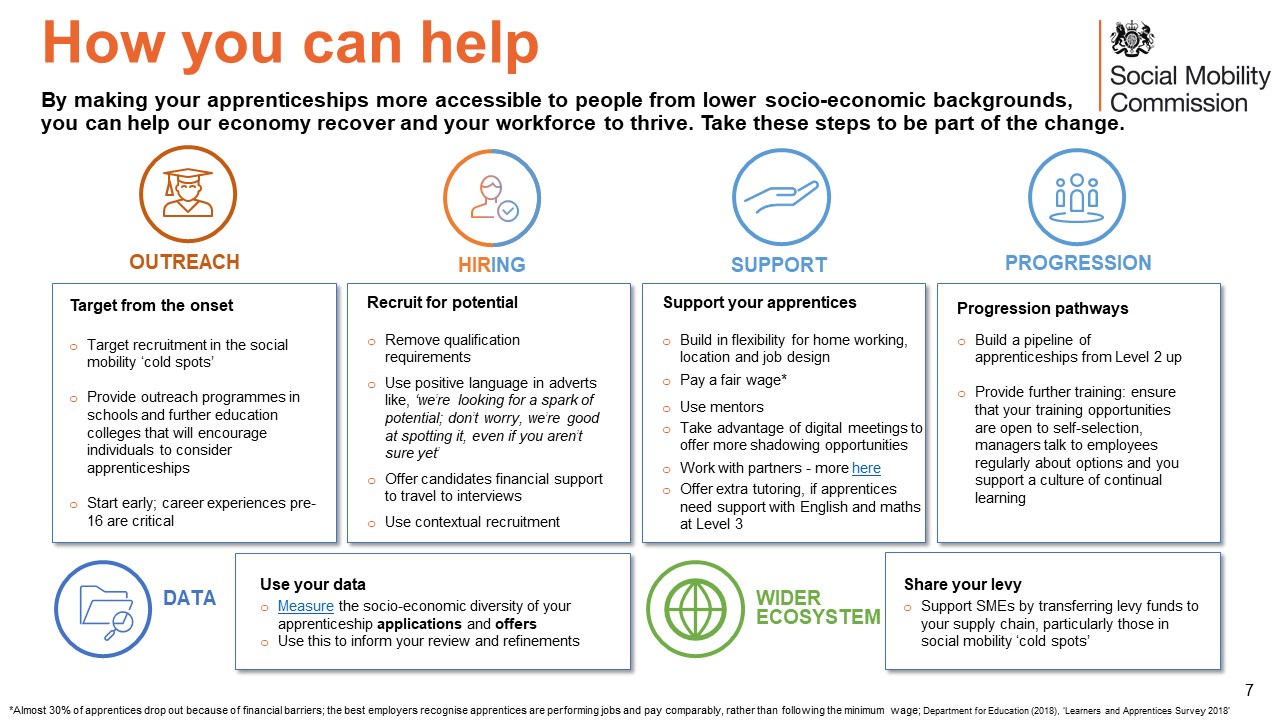To mark National Apprenticeship Week 2021, we held a special event on 10 February exploring how apprenticeships can drive social mobility. In this session we looked at the positive impact they can have on your workforce, but also delved into some of the key challenges faced by employers in reaching a diverse pipeline of talent.
We were joined by a fantastic panel, each offering a unique perspective:
- Jessica Oghenegweke, BBC Earth Kids presenter and SMC Commissioner
- Eddie Fletcher, Interim Head of Social Mobility, Ministry of Justice
- Norma Muyambo, Lieutenant Commander, Ministry of Defence
- Tom Pritchard, Employer Relationships Manager, Amazing Apprenticeships
A video recording, including the SMC presentation and panel discussion can be found below. Click here to download the powerpoint presentation and employer checklist to help you refine your ideas.
Why apprenticeships matter for social mobility
In order to recover from the pandemic we need a resilient workforce – one that can deliver results, drive innovation and offers access to all. Apprenticeships have a vital role to play in that recovery – 92% of firms who run a scheme believe it leads to a more motivated and satisfied workforce, while 80% report higher retention rates.
Those who start their careers via an apprenticeship have unparalleled knowledge from working their way up – leading to better decision-making, greater efficiencies and creative solutions for your business. Whilst each cohort of apprentices can learn from the previous one, sharing ideas and building a strong support network. The most successful programmes are refined, if not designed, with apprentices themselves.
For apprenticeships to be successful, the training undertaken needs to deliver real skills, that can be translated into real opportunities for progression. Employers should take a holistic approach and view each apprenticeship as a cycle, as opposed to an isolated segment of training, by planning for each stage – from outreach and hiring, to progression.

Why does all this matter when it comes to social mobility? Because our research shows that disadvantaged workers who complete an apprenticeship enjoy a bigger boost to earnings than their more privileged peers (16% vs 10%). Meaning apprenticeships have their part to play in closing the class pay gap, whilst providing people with a chance to earn while they learn – a crucial aspect for those from lower socio-economic backgrounds.
Yet between 2015/16 and 2017/18, the number of starters from disadvantaged backgrounds fell by 36%. The impact was even greater for older (aged 25+) and female apprentices. Since the Levy began, employers have fallen into the trap of supporting those who already have access to opportunities.
“I’d be pleased to see more programmes aimed at other young people at risk of falling through the gaps.” – Liam, Freshfields Stephen Lawrence Scholarship Scheme (from our Monitoring Social Mobility report).
Unfortunately, the pandemic has only served to widen existing gaps. During the first lockdown (23 March to 31 July 2020), there were 60,860 starts – a 45.5% drop compared to the same period in 2018/19. With fewer actively on schemes, those from disadvantaged backgrounds are falling further behind.
This is why it is so important that employers play their part in making sure those who need it most, receive the right support – enabling them get on the ladder, progress up the ranks or change paths, whatever point of their career they are at.
“Apprenticeships are a fantastic way to learn while you earn, opening up new and exciting career paths that can transform lives.” – Minister for Apprenticeships and Skills, Gillian Keegan.
Against the backdrop of the pandemic, employers are already coming up with innovative solutions not only in terms of the programmes they offer, but also how excess Levy is (re)distributed. Only last week, the Co-op announced a nationwide initiative designed to boost opportunities for under-represented groups, by channelling money from large companies to smaller businesses. The new fund will create apprenticeships for BAME candidates and those from lower socioeconomic backgrounds, in a bid to close the ‘opportunity gap’.
Nurturing your apprentices
Meaningful opportunities through apprenticeships can be life-changing, especially for those from lower socio-economic backgrounds. This is why for programmes to be effective in developing the skilled workers of tomorrow, employers need to nurture that talent.
Employers need to look for people who can add to their culture, as opposed to people who will just fit in.
We would encourage employers to look at how they can make the apprenticeship experience, and recruitment phase, as manageable as possible for disadvantaged learners. This could be by giving consideration to a working parent’s childcare responsibilities, helping learners from poorer backgrounds with travel costs or being mindful that not everyone has a quiet place to work at home (or reliable internet access) when working remotely.
An apprentice from a lower socio-economic background may not be able to provide an academic or indeed in-work context to demonstrate their skills, but they may have other real-world experience that clearly demonstrates aptitude and resilience. And those are attributes that would benefit any business.
It is therefore important to support apprentices and making your initiatives count for the long-term, by ensuring real prospects for the future. The success of any apprenticeship boils down to the effort that both parties put in – it has to be a two-way process, for both candidates and businesses to reap the rewards.
And it’s not just about securing an apprenticeship – for there to be real progress, learners need a clear path of opportunity once training is complete. What happens ‘after’ is equally important. Our research shows that apprentices from lower socio-economic backgrounds are often overlooked when it comes to progression. If businesses invest in training, they need to offer clear progression pathways – or a crucial opportunity to reap the rewards of that investment will be missed.
“I cannot stress enough the benefits to company performance and morale of providing real jobs, real wages and real progression for those from a wide socio-economic talent pool.” – Steven Cooper, incoming CEO of Aldermore Bank & Co-chair of the Social Mobility Commission.
Steven started his own career as an apprentice. Having left school at 16 he joined Barclays, where he rose from cashier to senior roles including CEO Barclaycard Business, CEO Personal Banking for UK and Europe and CEO UK Business Banking.
Diversity is about recruitment; inclusion is when people feel welcome, supported and involved once they’ve joined an organisation.
Creating access to quality apprenticeships for people from lower socio-economic backgrounds is only part of the endgame. The success of your interventions will be measured by whether you are willing to let the organisation be shaped by the diversity of your staff. Developing a more diverse and inclusive culture is an investment for the long run. Appoint a senior leader to champion these values – and lead from the top. People can’t be what they can’t see, so find relatable role models to attract people from underrepresented backgrounds. Start a conversation about class and encourage people to share their stories openly with their peers.
Ultimately, a more diverse business is a more productive one – those in the top quartile for ethnic/cultural diversity are 33% more likely to outperform on profitability[1]. So there is a clear need to nurture talent and not set limits on progress. Employers can do this by measuring diversity, carefully monitoring the class pay gap, ensuring promotion practices are fair, and creating an inclusive, welcoming culture that will benefit all employees. This will help promote great values, whilst attracting and retaining the very best people.
The apprentices of today may well be the bright stars of tomorrow.
Learn more
If you’d like to delved into some of the issues faced by aspiring apprentices from lower socio-economic backgrounds, you can read the Social Mobility Commission report Apprenticeships and social mobility: Fulfilling potential.
[1] McKinsey & Co, Delivery through Diversity, 2018
